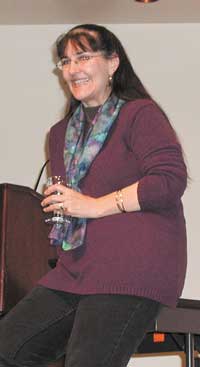Sac State grad sheds light on Afghanistan

Image: Sac State grad sheds light on Afghanistan:Former student Patricia Omidian speaks to students at Hinde Auditorium on Nov. 13 about her time in Afghanistan. Photo by David Dixon/State Hornet :
November 27, 2001
When Patricia Omidian thinks of Afghanistan, she sees a much deeper picture than many students see on the news. She sees a country that has endured 23 solid years of war and four years of drought. She also sees a people that travel by foot and have no access to health care, but remain amazingly resilient.
Omidian, a Sacramento State graduate, lived as a teacher in Afghanistan and Pakistan for four years. She spoke on Afghan life Nov.13 in Hinde Auditorium.
“Out of every four children born, one will die before the age of five,” Omidian said. “You have a good chance of catching polio, typhus and tuberculosis. You have a 75 percent malnutrition rate. You have a diet of tea and bread and, if you?re lucky, you have sugar. That?s what we?re talking about in Afghanistan ? and that?s before Sept. 11.”
While in Afghanistan, she worked mostly in Bamain, Herat and Kabul.
“Kabul was my least favorite,” Omidian said. “It?s been leveled by the bombings and destruction. It?s the quietest city I have ever been in. It?s like no one wants to make any noise ? its quite distressing.”
Afghans have gotten used to turmoil. More than 75 percent of the population has been displaced at one point in their lives, and landmines kill and maim people every day, Omidian said. This past July, she met a man who had buried five children in one year, all due to starvation.
“I have seen people who have told me ?We have to eat dirt, because we don?t have anything else,? and you look around and it?s true ? they have nothing to put in their stomachs,” Omidian said.
Those who look for relief often cross the border to Pakistan, where they are offered free housing, schooling and healthcare, Omidian said. The housing consists of a tent, blanket and cooking pot, and classrooms are large blankets laid on the ground.
Omidian was in Pakistan with the refugees on Sept. 11 when news of the attacks hit.
“The initial reaction was surprise and shock. Everyone said, ?Osama did it. He said he was going to do it and he did,?” Omidian said. “I?ve found that the Afghans were always amazed that the U.S. seemed to stop caring about them. As they see it, they helped (the United States) rid the world of communism. They felt deserted. Sept. 11 was such a mixed blessing, and one of the blessings is that people are finally remembering that Afghanistan exists.”
She stressed her belief that certain countries should not be involved in Afghan politics after the U.S. military strikes end. “I think we need to get an international peacekeeping group in,” she said. “I don?t think it should include countries like Pakistan, Russia, Iran and the U.S. that are trying to control Afghan politics. I think they need to stay out.”
Omidian has seen Afghans endure year upon year of war, poverty and oppression, and sees them as some of the most resourceful, intellectual and compassionate people in the world. The refugees themselves started many of the aid agencies in Afghanistan and Pakistan, she said.
“They do remember Afghanistan before (the war), and they invoke those images,” she said.
Omidian has faith in the resilience of the Afghans.
“They all have a vision of what is possible, and as long as they have that vision, there?s hope that we can find a peaceful solution,” she said.




























































































































